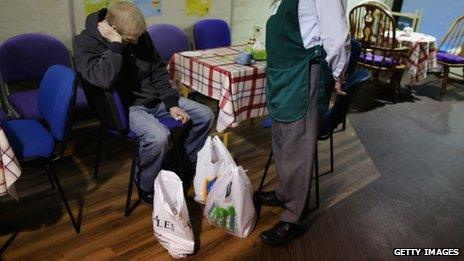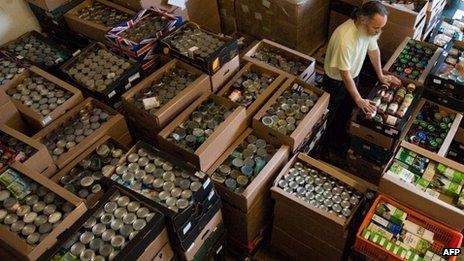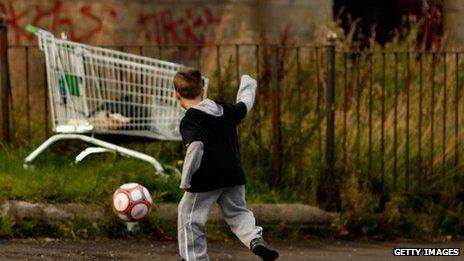How do you define poverty in Scotland?
- Published

Charities have launched a campaign urging people to fight against poverty
A group of charities has launched a campaign aimed at highlighting the "humanitarian crisis", claiming that more than 870,000 people are living in poverty in Scotland.
But what is poverty? Is it something which can be defined by official statistics?
Charities, such as the Joseph Rowntree Foundation (JRF), say that understanding exactly what poverty is provides the first step towards being able to tackle it.
But first it is important to know what poverty is not.
In a report entitled "What is meant by poverty?", external the foundation said: "When we talk about poverty in the UK today we rarely mean malnutrition or the levels of squalor of previous centuries, or even the hardships of the 1930s before the advent of the welfare state.
"It is a relative concept. 'Poor' people are those who are considerably worse off than the majority of the population - a level of deprivation heavily out of line with the general living standards enjoyed by the majority of the population in one of the most affluent countries in the world."

The use of foodbanks has been on the rise
Dr John McKendrick from Glasgow Caledonian University, who has written extensively on poverty issues, agreed with JRF.
"In Scotland today, we describe people as being 'poor' if they live in a household which is so far removed from a standard of life that we regard as acceptable.
"It's about more than 'not having as much as others', it's about not being able to access what everyone in modern Scotland should be able afford.
"We do not, and should not, judge poverty in modern Scotland by comparing against Scots in the 19th Century or with people in developing parts of Africa."
Common definition
But there are also official measurements of poverty, which are used by governments and charities to monitor the situation.
The most common definition of the poverty line, which has been adopted throughout the EU, is based on median income.
Taking all of the earnings in the country, the median is the point where half the people have more and the other half have less.
Those with less than 60% cent of median income are classified as "poor".
Martin Johnstone, secretary of the Glasgow-based Poverty Truth Commission, said: "On that basis, it is not unreasonable to suggest that 870,000 people in Scotland - more than one in six - are living in poverty."

There are different definitions of the income which is needed to make ends meet
He added that this definition of poverty did not tell the whole story.
"Life expectancy in some parts of Glasgow is in the low 50s. And that is no different from some parts of Africa and other developing nations," he said.
The JRF admitted that median income was arbitrary, since there is no exact calculation that it is a threshold of minimum income which is acceptable to society.
It carried out research, external asking ordinary people to discuss in detail what would need to go into a family budget, and concluded most required a little more than the 60% threshold to make ends meet.
There are also official definitions of child and income poverty.
The Scottish government has pledged to eradicate child poverty by 2020. This is defined as children living in households with less than 60% of the median income.
Improving access
Meanwhile, those in fuel poverty spend more than 10% of their net income on fuel.
But John McKendrick said tackling poverty was not simply a matter of improving income - it was also about improving access to resources to provide a decent standard of living.
"Local authorities, charities and community groups can all play their part," he said.
"Food banks can help prevent people below the poverty line from going hungry, and local councils, for example, can offer access to leisure facilities to those who can't afford it to improve their quality of life."
- Published4 March 2014